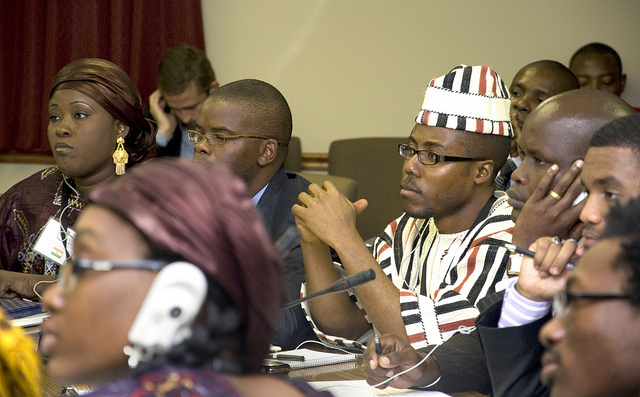Liberia is the oldest independent country in Africa. Before the 1980s, we were quickly developing with a vibrant education sector, which contributed to the empowerment of citizens from other neighboring countries. We had an economy improving and contributing to the social welfare of citizens.
The country then suffered a 14-year civil crisis which ruined every sector in the country. This great loss caused citizens to give up hope of ever having a country on the trajectory of economic improvement, the social wellbeing of citizens, infrastructural development, and reduced poverty.
This experience has had a trickle-down effect on Liberia’s current status, and the only pragmatic solution is if Liberia is to become a developed nation, is to invest a lot of resources with strong policies in education. Much emphasis must, therefore, be placed on the youth.
What are the practical solutions?
Sustainable development is a long-lasting economic, infrastructure, social, educational development in a country or the world-at-large. The essence of this form of development is a stable relationship between human activities and the natural world, which does not diminish the prospects for future generations to enjoy a quality of life at least as good as our own.
Various areas of sustainable development must be inclusive of youth involvement. The direction of youth employment must shift from the public sector to self-initiatives in the private sector. There must be policies to support youth entrepreneurship in the private sector.
Education:
There must be more scholarships opportunities for youth who have the abilities and passion for acquiring foreign education so that they can invest in developmental initiatives. There must be an independent and intelligent national committee to vet students who go out of the country to acquire foreign education.
Students must prove past progress in intended fields of studies, and submit a full business or technical proposal of what the knowledge will be used for when acquired.
While out of the country studying, there must be a strong monitoring committee to follow up on the activities of those students benefiting from scholarships that are supported by the government.
Students who return home from studies must be given an opportunity to participate in a government-sponsored entrepreneurship training, wherein they can submit a business startup plan and be given access to non-collateralized loans for youth-led business start-ups, reduced administration hassle for registering businesses, and tax breaks for youth-led sustainable business start-ups. This will allow the employment of other Liberians and will help in the reduction of unemployment rate in the country.
Empowerment:
Infrastructural development is a major factor in a developed nation. This plan provides support to the economy, creates more employment, and gives good livelihood to citizens. The more the youth of Liberia get involved in this area, the more knowledgeable we will become to develop and sustain our country’s infrastructures.
Youths who are in the field of engineering must be given empowerment opportunities. There are more vacant lands around the country. We must allow for real estate companies to bring in investments. These companies must partner with Liberian companies run by youth to implement these projects, after which the capacities of these youths shall be improved to implement similar projects independently. This should expand the infrastructure in the country.
Our concession agreements must be revised in order for the youth to fit in the empowerment scheme. When a person is empowered, rather than just being employed, his capacity is built to undertake initiatives that can empower and employ others.
The government must embark on a national internship program. Every government ministry and agency, concession company, and national and international institutions must develop an internship plan. This plan should allow for high school graduates and university students to acquire hands-on practical knowledge during their time of internship upon which they will be built up in their respective careers. Upon graduation, youth who enroll in the internship programs can be given the opportunity to engage in self-initiatives.
Responsibility:
The government, along with its partners, must support youth-crafted programs to educate communities and families on sustainable agriculture technologies to improve food production and distribution in order to create more employment and help in reducing poverty. Youth and families must be encouraged to grow their own food both to feed themselves and educate themselves about food production.
Youth must be represented at every level of Government. The government must also enable youth to be represented at every international assembly through their support. This will give youth the opportunity to understand sustainable development from a global perspective and help them be thoughtful about creating programs in any of the sectors of sustainable development. This program must have a national support.
Youth who apply and receive an invitation to international conferences, seminars, training, workshops, summits, or fellowships must present to a ministry or agency whose functions aligns with the purpose of such program. After submission, the ministry or agency requests a proposal about how the individual is going to use the knowledge and what benefits are there in participating in such.
Afterward, the government must take responsibility to fully sponsor these youth for these gatherings. This will build up strong networks, give the youth a broad understanding of issues, and bring about ideas of how the youth can incorporate good programs of sustainability.
Entrepreneurs:
Liberia has many youths becoming entrepreneurs. This is a good development that will help boost our economy, create more jobs, and reduce poverty. However, if there is no sustainability plan by our government or its partners, these initiatives will not continue.
Youth who are into production of products and delivery of services and other work, and have a good business plan and strategy but low income, must be given subsidies that will empower their businesses or companies. The government must take responsibility to promote these entrepreneurs, who shall contribute immensely to the sustainable growth and development of the country.
The Commerce and Information Ministries must develop a national marketing plan to showcase products of young Liberian entrepreneurs throughout Africa and the world. Foreign goods and services being imported into the country, which is also being produced by Liberian entrepreneurs here in Liberia must have a high tariff and complicated process; and the supply of these foreign goods and services must be regulated to be sold at a higher cost to allow Liberians to become more efficient, effective, and income generating.
Alternatively, these foreign companies and business must partner with Liberian firms in particular fields of production of services. All these developments, when backed by sustainable plans, can become long term and contribute immensely to the growth and development of the country.
The only way a country can become developed sustainably is through investment in the education and empowerment of the youth in the country.
Every sector of Liberia must incorporate the involvement of youth. Sectors which can become vibrant to sustain the livelihood of citizens must have youth being educated to manage them.
Important areas contributing to the country and being managed by foreigners must incorporate youth who will go out to acquire the requisite knowledge. There must be attractive salaries and good corporate benefits for Liberian expert and professional youth, so as to not scare them away from contributing to the country’s development.
There is still a lot to be done. And with youth education and empowerment treated as a major priority, Liberia can be a developed nation with sustainable programs in the near future.
Photo courtesy of Flickr



